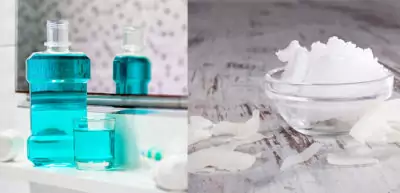PCOS test is based on the Rotterdam criteria for diagnosing PCOS.

Living Well
Oil pulling is an ancient Ayurvedic technique of cleansing and detoxifying the teeth and gums. But, doesn’t rinsing your mouth with mouthwash also provide the same benefit? We share some reasons why oil pulling is better than mouthwash.
Rinsing your mouth with mouthwash doesn’t give you pearly whites. In fact, studies suggest that mouthwashes, which contain a chemical named chlorhexidine gluconate, can cause staining of the teeth. When the chemical is exposed to the teeth, it can lead to brown stains on the enamel.
However, oil pulling, when done regularly, can help in removing existing stains from the teeth, resulting in whiter teeth. There are several videos on YouTube, which shows people with whiter teeth within 15 days of oil pulling.
Oil pulling can help keep bad breath at bay. Bad bacteria in the mouth is the reason behind bad odor. Oil pulling helps in curbing the production of bad bacteria in your mouth. According to a 2008 study, oil pulling was found to be as effective as chlorhexidine mouthwash in removing plaque (mass of bacteria). On the other hand, alcohol, which is a common element of most mouthwashes, can lead to dryness, thereby leading to bad breath.
That sounds absurd, right? The chemical chlorhexidine, a common ingredient in most mouthwashes, kills both good and bad bacteria present in the mouth. Good bacteria release nitrates that relax blood vessels and regulate blood pressure. By killing good bacteria, chlorhexidine can raise your blood pressure. On the contrary, oil pulling has no such side effects.
According to a 2008 study published in the Dental Journal of Australia, alcohol present in the mouthwashes can increase the risk of oral cancer. Also, high concentrations of ethanol (alcohol) within mouthwash can lead to side effects such as ulcers, gingivitis, and oral pain. In fact, the results of a 1995 study, which is published in the Journal of Periodontal Research, shows a direct correlation between ethanol content in mouthwash and the amount of paint induced by it. Some mouthwashes have ethanol concentrations as high as 26%. Oil pulling, on the contrary, is done using natural oils that are free of alcohol. The technique has been used for centuries and is considered free of side effects.
Staining and calculus formation after 0.12% chlorhexidine rinses in plaque-free and plaque covered surfaces: a randomized trial
https://www.scielo.br/scielo.php?script=sci_arttext&pid=S1678-77572010000500015